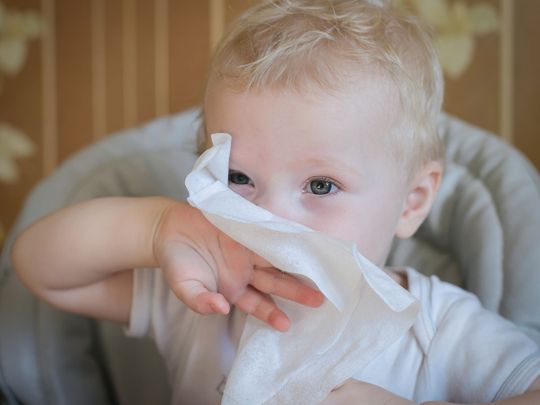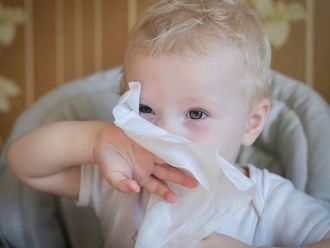
It’s not uncommon for children to demand attention, sometimes by acting out. But unusual behaviour may indicate a serious underlying condition. A reader, who requested anonymity, wrote in to us wondering about why her three-year-old is eating tissue. Is it something that should worry her or will a conversation be able to resolve the issue? We asked an expert.
Dr Rajshree Ragupathy, Specialist Pediatrician at Aster Clinic, answers:
Eating non-nutritive substances that cannot be classified as food such as mud, paint, glue, hair and more specifically, as in this case paper, is called pica and can be seen in both adults and children, but it most commonly occurs in children. It is estimated that it occurs in 10 to 30 per cent of children aged one to six. The specific act of eating paper is called Xylophagia.
Most children indulge in a phase where they put whatever they find into their mouth; that is to say they explore the world with their mouth. Babies will also find things to chew on while growing teeth. These one-off tendencies are not labelled as pica or considered an eating disorder.
So when should alarm bells ring for parents?
While some chewing practices are common among infants and toddlers, there is a point at which a parent must show more concern. This is if:
1. The habit to eat non-nutritive substances continues for more than a month and is quite persistent.
2. The habit continues in stealth even when the child is restricted access to those substances.
3. The behaviour is inappropriate for the child’s age or developmental stage.
Why should a parent be concerned?
Sometimes repetitive eating of these substances can lead to stomach infections, stomach ulcers, bowel problems such as constipation or diarrhea, and injury to the teeth and gums.
What are the main causes of pica?
Several theories have been proposed as to why children indulge in pica. Hunger, malnutrition, specific deficiencies of some nutrients (most commonly iron), obsessive compulsive disorder, a soothing habit for emotional stress, and autism have all been linked to pica.
If the behaviour persists, then a visit to the child’s paediatrician for tests is highly recommended.
The doctor would recommend blood work to test for nutrient deficiencies such as iron and zinc. Most often just changing the diet and adding some supplements to it have seen a decrease in pica in children with nutritive deficiencies.
If the child’s pica is unrelated to nutritive disorders, the doctor may consider behavioural and developmental disorders and diagnose or eliminate these diagnoses.
How can you as a parent help distract a pica episode?
Stay calm, don’t indulge in a knee-jerk reaction. Remember an overreaction or negative approach can adversely increase the cravings. Here are some things you can do.
1. You can ask if the child is hungry or just plain bored: If they are hungry you can divert their attention to a healthy snack; if the snack has the same texture as their craving, then the child should be suitably satisfied. For a craving of tissue paper, for instance, cooked pasta can do wonders. If the child is bored find something fun and distracting to do.
3. Look for other things to distract them: For children with strong oral needs finding a substitute may be necessary – try oral sensory toys, getting him/her to sip using a straw.
4. Trying to identify the triggers and the emotions: Soothing them or helping them release the excessive energy or negative emotions they have can gradually reduce the incidents.
5. List the incidents: Keeping a log of the incidents and events that led to pica episodes help in identifying triggers and thereby preventing them. Coping skills can then be taught.
6. Educate other caretakers: All the other caretakers in the child’s life should be made aware of the habit, triggers and distracting methods. Having a plan and clear communication is essential to curbing this behaviour.
Most children outgrow pica successfully eventually. Work hand in hand with your child's care provider .
Do you you have a parenting concern you'd like addressed? Write in to us at parenting@gulfnews.com









